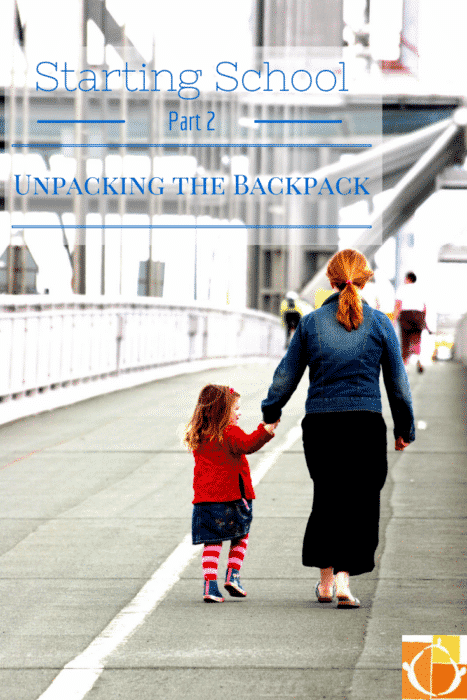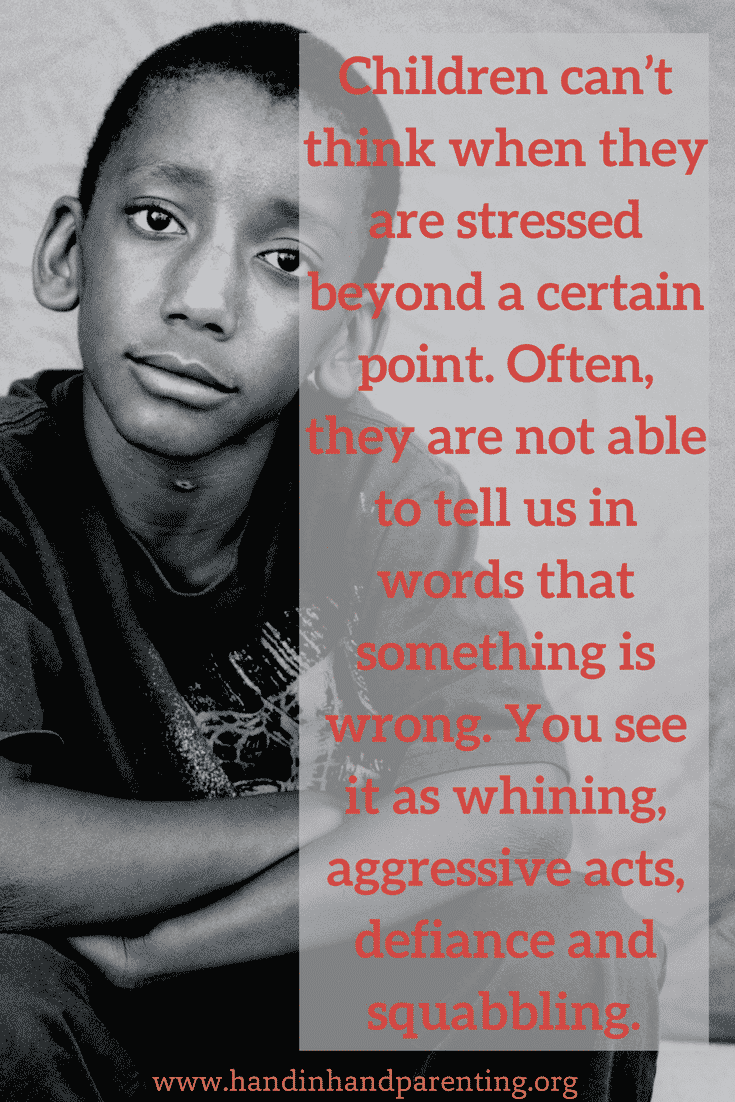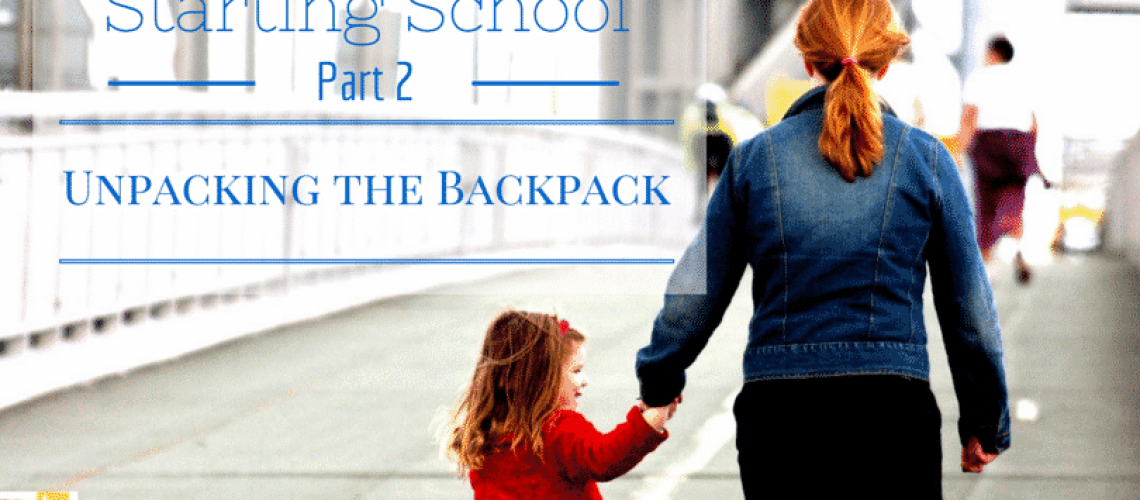My daughter’s first day of school was one of the hardest days of my life. Although we had some times in the past when separating from one another had been full of feelings, we worked through them together, and things, up to then, had been pretty smooth. Cheerful up to that point, on this day she started to wail and cling to me as she lined up at the doorstep of the classroom.
 The teacher looked increasingly alarmed, and then more and more annoyed with me. Other children were beginning to waver in their confidence, considering joining my daughter in a serious cry. Heartbreaking as it was, it just was not going to work for me to stay. I walked away, my nerve ends on fire. Over time it got easier, but I had to work hard at it.
The teacher looked increasingly alarmed, and then more and more annoyed with me. Other children were beginning to waver in their confidence, considering joining my daughter in a serious cry. Heartbreaking as it was, it just was not going to work for me to stay. I walked away, my nerve ends on fire. Over time it got easier, but I had to work hard at it.
Whether the summer is drawing to a close, or you are thinking about starting school in the New Year, it’s a good time to be preparing your child, and yourself, for the transition.
In Part 1, I discussed the important role parents and carers have in building an “emotional safety net” as our children start school for the first time, begin a new school or return to school after the long summer. We can make time to help our children and ourselves through the transition to school and use Special Time to give our child the “connection vitamins” they need to get through the day.
However, upsets will surely come. How can we best help our children to unpack their “emotional backpack” and get rid of the difficult feelings which they bring home from school?
Expect Upsets
“She’s been so grumpy lately!” a father told me as we struck up a conversation. “She keeps getting upset about little things, and she seems to be struggling with maths homework that I know she could do last year.” After a few questions, I learned they had just moved into town, and she was a few weeks into starting at a new school.
It’s a common story. Perhaps because we are big, and we know a lot about the world, we can take these kinds of transitions in our stride—although they rate amongst the most stressful for adults too. But for children, starting school, or a new school, can be huge. Perhaps they have had some preparation at childcare or preschool, but almost everything and everyone in the day is new.
Children can’t think when they are stressed.
Children can’t think when they are stressed beyond a certain point (a different point for each child, and each occasion). Often, they are not able to tell us in words that something is wrong.
Infuriating as this is, there’s a good explanation. Under stress, the part of their brain that deals with executive functions—the “thinking brain”—isn’t working. This is their pre-frontal cortex, which deals with reasoning, problem solving, analysing information, maintaining attention, and inhibiting emotional impulses. *1
Under stress, our children are flooded with feelings, so their sense of “all being right with the world” goes off-line, and often, they don’t feel at all connected with us.
The gift of small upsets.
Children, unable to articulate what has caused the problem, find small pretexts for their upsets about—it could be that they “can’t” find the right dress to wear, they “can’t” do a maths problem, their hair is not right, there are peas on their plate, or they are being asked to sit in the wrong car seat.
All those little blow-ups are actually clearing the decks, allowing your child to drain tension they have accumulated during the day or the week. They may be functioning really well at school—managing to figure out the rules, make friends, and absorb what they are taught. But when they get home to you, it all unravels.
A father told me this story. His son was a great swimmer, and in the previous school year had moved quickly and happily up the levels. Over the summer, he was promoted to the “big pool” and was confident and proud of himself. In the first week of school, however, when they arrived at the pool after school he refused to get in. His dad kept gently encouraging him to get in, but the boy was in tears at the side of the pool. The father told me:
“We stayed there, with me gently encouraging him into the pool, for as long I as could stand it. I let him cry. After a while, the swimming teacher came over and tried to ‘jolly him out of it' and I decided it was time to go home. I think my son was just drawing the line. Even though it was his second year at the school, and his return to school had gone well, the week had been just too much. It all came to a head over getting in the pool. He had hung onto those feelings all day and now that I was there it was safe to show how hard it really was.”
Separations
One of the most common experiences for children starting school is separation from you. These feelings are a bit like a scab—at first very raw, but over time the skin dries out and hardens and the feelings are less available to feel. But every now and again, something brushes against the scab and the feelings are right there again.
Starting school for the first time, or after the long summer holidays, can pull up old feelings of separation. Be kind to yourselves and your children: leave time for some extra upsets over the first few weeks, as the scab is lifted again, and as feelings about school and about leaving you surface again. Take every opportunity you can to listen to your child—when he seems to be having big upsets about small things, or seems to be much more clingy than usual.
 The healing process – unpacking the backpack
The healing process – unpacking the backpack
Just like play, I think children know they need opportunities for emotional release. Crying releases the sadness and tantrums release frustration. And laughter, it turns out, releases light fears and embarrassment. This is why the whole classroom starts to giggle when Johnny gets in trouble for being in the wrong place. They are not being disrespectful. They are releasing light fear.
This sort of emotional release will help a child to recover. It’s especially effective when a child is “anchored” by a compassionate, caring adult who is able to see them through without reacting, rejecting, blaming, explaining away the upset, or rushing to reassure or comfort them. We call this Staylistening.
When the upset has passed, the child will regain access to their “thinking brain” – which was previously offline and flooded with emotion.
“It’s not safe to cry there, Mummy”
This is what my friend’s daughter concluded about school. Raised in Parenting by Connection, she expected her feelings to be welcomed and worked through. We had to explain that it was hard for the teachers to listen, given all the things they were trying to manage. But we assured her that she could save it up until she got home. We would listen to her then.
I think most teachers know that strong emotions can get in the way of a child's ability to learn. But they are seldom in a position to allow a full-blown upset. And there is the strong impression, in schools and in society in general, that the upset is the hurt. We think that if we stop the crying, we stop the hurt. But in fact the crying and the upset are the process of releasing the hurt. Tears of upset contain stress hormones which are not found in the tears we shed when we cut an onion. *2
My friend's daughter is remarkably clear about this. Preparing for her first school sleepover trip, she said “The problem isn't that I am going to miss Mummy. I am. It's that no-one there will let me cry about it.” And my daughter, now 11, says “I wish the teachers wouldn't do all that stuff of offering us a glass of water when we are upset. It just makes us stuff the feelings down.”
Becoming a school parent.
Part of the project of becoming the parent of a school-aged child is developing ways of helping your child with her feelings about school when she’s safely home with you. Building connection and closeness through Special Time, and knowing that upsets, big and small, are an opportunity you can respond to with Staylistening will help.
We want the best for our children. Starting or re-starting at school is a time of transition for adults and children alike.
To keep supporting your child in the way you want, you will also need to build support around yourself, so you can keep thinking and building the relationship you will need in order to be the best “school parent” you can be.
In the Parent Club Community, you can find Listening Partners, get daily coaching and weekly live zoom support calls.
You can also learn more about building connection with your children, and the Listening Tools in the Foundations Course for Parents & Caregivers.
Notes
*1 Medina, J. (2009). Stress – Rule #8: Stressed brains don't learn the same way. In Brain rules: 12 principles for surviving and thriving at work, home, and school (pp. 169-195). Seattle, WA, USA: Pear Press. On p. 80 Medina describes the role of prefrontal cortex.
* 2 Mann, N. (no date). The health benefits of crying. Retrieved July 30, 2015, from <http://www.netdoctor.co.uk/healthy-living/wellbeing/the-health-benefits-of-crying.htm#ixzz2pg8Fp4Bd>
